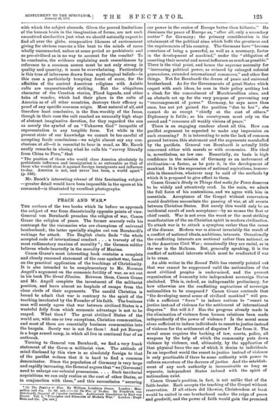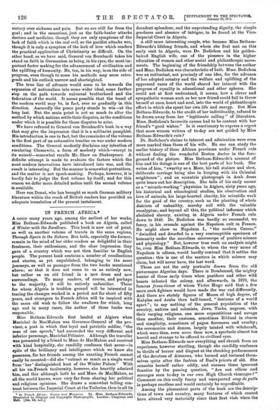PEACE AND WAR" THE authors of the two books which
lie before us approach the subject of war from diametrically opposite points of view. General von Bernhardi preaches the religion of war, Canon Grane the religion of peace. The former scarcely veils his contempt for the visionaries who are champions of universal brotherhood ; the latter specially singles out von Bernhardi's -writings for attack. The English cleric finds " the whole accepted code of international conduct . . . a travesty of the most rudimentary maxims of morality " ; the German soldier believes whole-heartedly in the morality of Maxims.
Canon Grane's most interesting book contains a complete and closely reasoned statement of the case against war, based on the practical application of the teachings of Christianity. It is also intended to be complementary to Mr. Norman Angel's argument on the economic futility of war, as set out in his book The Great Illusion. Between them, Canon Grane and Mr. Angell complete the investment of the militarist position, and leave almost no loophole of escape from the close circle of their arguments. The candid Christian is bound to admit that war is contrary to the spirit of the teaching inculcated by the Founder of his faith. The business man will surely agree that war between civilized States is a wasteful folly from which economic advantage is not to be reaped. What then ? The great civilized States of the world are, with one or two exceptions, Christian communities, and most of them are essentially business communities into the bargain. Surely war is not for them ! And yet Europe is a huge armed camp, in which all live in continual fear of an outbreak.
Turning to General von Bernhardi, we find a very frank statement of the Germ-in militarist view. The attitude of mind disclosed by this view is so absolutely foreign to that of the pacifist writers that it is hard to find a common denominator. Since the population of Germany is very large and rapidly increasing, the General argues that " we [Germans] need to enlarge our colonial possessions. . . . Such territorial acquisitions we can only realize at the cost of other States, or in conjunction with them," and this necessitates " securing
• (I) no Passing of War. By William Leighton Grane. London Mac- millan and Co, 7s. 6d. net. 1—(2) On War of To-dag. By Friedrich von Bernhardi, General of Cavalry (retired). Authorised translation by Karl von Donat. Vol. 1, "Principles and Elements of Modern War." London : Hugh Bees and Co. [9s. net.]
our power in the centre of Europe better than hitherto." He dismisses the peace of Europe as, "after all, only a secondary matter" for Germany ; the primary consideration is the attainment of the political aims which befit the greatness and the requirements of his country. The Germans have " become conscious of being a powerful, as well as a necessary, factor in the development of mankind," under the "obligation of asserting their mental and moral influence as much as possible." There is the vital point, and hence the supreme necessity for " increasing political power, as evinced by enlarged colonial possessions, extended international commerce," and other fine things. Not for Bernhardi the dream of peace and universal brotherhood. As for the Governments of great States which coquet with such ideas, he sees in their policy nothing but a cloak for the concealment of Macchiavellian aims, and an obstacle set up for the very purpose of preventing any "rearrangement of power." Germany, be says more than once, has not yet gained the position "due to her " ; she cannot do so except " chiefly at the cost of others." Diplomacy is futile; so his countrymen must rely on the sword and " renounce all weakly visions of peace."
There is an engaging candour about all this. How can pacifist argument be expected to make any impression on such reasoning? It is interesting to note the lack of common ground between this statement and the arguments marshalled by the pacifists. General von Bernhardi is actually little concerned either with morals or with economics. His ideal is, nevertheless, no low one. Essentially, its basis is high confidence in the mission of Germany as an instrument of civilization—a factor, as he puts it, in the development of mankind. It is the expression of national aspirations, honour- able in themselves, whatever may be said of the methods by which it is proposed to give effect to them.
Canon Grane's Study in Things that make for Peace deserves to be widely and attentively read. In the main, we admit the full force of his contentions, and we agree with him in essentials. Acceptance of the Gospel without reservation would doubtless necessitate the passing of war, at all events between Christian States. But surely this would only be an incidental result of such acceptance—by no means the first or chief result. War is not even the worst or the most striking manifestation of the un-Christian spirit in modern civilization. To attack war is to attack a symptom rather than the cause of the disease. Modern war is almost invariably the result of a conflict of national ideals, ambitions, interests. Occasionally the conflicting interests are sectional rather than national, as in the American Civil War ; occasionally they ar•e racial, as in the war in the Balkans. But, generally speaking, it is the conflict of national interests which must be eradicated if war is to cease.
An able writer in the Round Table has recently pointed out that war cannot be suppressed until the nationalism of the most civilized peoples is undermined, and the present organization of humanity into independent sovereign States abolished. This is, indeed, an indispensable preliminary, for how otherwise are the conflicting aspirations of sovereign nationalities to be composed P Canon Grane contends that "the developing moral sense of civilized mankind" will pro- vide a sufficient " force " to induce nations to " resort to justice instead of violence for the settlement of international disputes." But will it P Has the progress already made in the elimination of violence from human relations been made independently of the power of violence P Is the moral sense alone sufficient to induce individuals to resort to justice instead of violence for the settlement of disputes P Far from it. The moral sense requires the backing of law, courts, police, all weapons by the help of which the community puts down violence by violence, and, ultimately, by the application of that physical force the use of which it denies to individuals. In an imperfect world the resort to justice instead of violence is only practicable if there be some authority with power to enforce execution of the decrees of justice. And the establish- ment of any such authority is inconceivable so long as separate, independent States imbued with the spirit of nationalism exist.
Canon Grane's position, in fact, is not unlike that of the faith-healer. Each accepts the teaching of the Gospel without reservation. If all others did likewise, Christendom at least would be united in one brotherhood under the reign of peace and goodwill, and the power of faith would gain the promised
victory over sickness and pain. But we are still far from the goal ; and in the meantime, just as the faith-healer attacks doctors and medicine, though they are only symptoms of the lack of faith which is the real evil, so the pacifist attacks war, though it is only a symptom of the lack of love which renders the practical application of Christianity so difficult. On the other band, as we have said, General von Bernhardi takes his stand on faith in Germanism as being, in his eyes, the most im- portant factor making for the advancement of civilization and the uplifting of humanity. He, too, in his way, is on the side of progress, even though to some his methods may seem retro- grade and his outlook narrow and shortsighted.
The true line of advance would seem to be towards the expansion of nationalism into some wider ideal, some further step on the path towards universal brotherhood and the federation of the world. It seems possible that the trend of the modern world may be, in fact, ever so gradually in this direction. Assuredly the peace party stands to win—at the long last. But the main point is not so much to alter the method by which nations settle their disputes, as the conditions under which it is possible for those disputes to arise.
We have referred to General von Ber•nhardi's book in a way that may give the impression that it is a militarist pamphlet. His introduction is one in fact, but the remainder• of the volume is the first part of an exhaustive treatise on war• under modern conditions. The General modestly disclaims any intention of emulating Clausewitz, a form of modesty which—except in its naivete—somewhat recalls Mr. Shaw on Shakespeare. A definite attempt is made to evaluate the factors which the most modern innovations have introduced into war, and the result is interesting. But the manner• is somewhat pretentious, and the matter is not epoch-making. Perhaps, however, it is hardly fair• to judge the first volume by itself ; and for this reason we defer more detailed notice until the second volume is available.
Herr von Donat, who has brought so much German military literature within the reach of British readers has provided an adequate translation of the present instalment.



























































 Previous page
Previous page